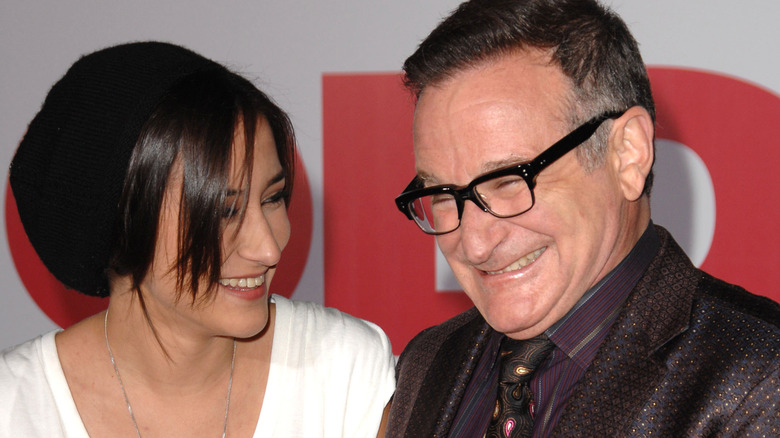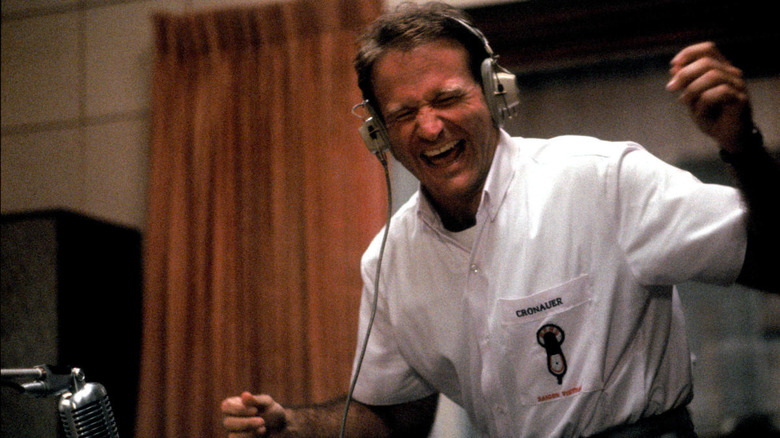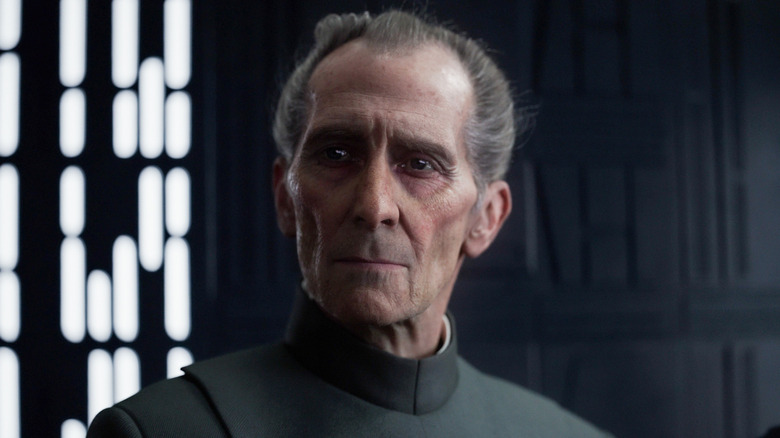Robin Williams' Daughter Condemns AI Cloning Of His Voice As 'Horrendous' And 'Frankensteinian'
The lives of celebrities can feel very distant (they're called "stars," after all), and discussions of the ethics of AI in Hollywood are therefore mostly centered on broader concerns like devaluing actors' work and impacting the quality of films and television. But a statement by actress Zelda Williams, daughter of beloved comedy performer Robin Williams, has brought a reminder of another major issue: family members having to hear their late loved ones' voices recreated without the person's consent.
Zelda Williams — whose roles include voicing Kuvira in "The Legend of Korra" and various characters in the animated "Teenage Mutant Ninja Turtles" TV shows — signal-boosted a statement by SAG-AFTRA's AI advisor, Justine Bateman, on her Instagram Story on Sunday. Williams followed that up with a statement of her own, writing:
"I am not an impartial voice in SAG's fight against AI. I've witnessed for YEARS how many people want to train these models to create/recreate actors who cannot consent, like Dad. This isn't theoretical, it is very very real. I've already heard AI used to get his 'voice' to say whatever people want and while I find it personally disturbing, the ramifications go far beyond my own feelings."
The use of AI to replace work by writers and actors was a key sticking point in the recently-resolved WGA strike and the ongoing SAG-AFTRA strike, and will be one of the issues contested in upcoming negotiations between SAG-AFTRA and the AMPTP. In her statement ahead of negotiations, Bateman warned:
"As of now, there are no entertainment union restrictions on generative #AI models ingesting 100 years of films/series, slicing and dicing them, and then popping out patchwork spoonfuls of all that work. I assume the AMPTP is going to try to pattern-bargain that on SAG."
'A poor facsimile of greater people'
Like a lot of the hype surrounding AI, the current abilities of voice-cloning are somewhat overblown. Earlier this year a track called "Heart on my Sleeve" was touted as an "AI-generated" song by Drake and The Weeknd, which led many to assume that the song, its lyrics, and its vocals were entirely an AI creation. In fact, a representative for the song's anonymous creator confirmed to the New York Times that it was "an original composition written and recorded by humans." The only "AI" involvement was the use of voice-changing technology to make the singer's voice sound like Drake and The Weeknd — essentially an advanced version of auto-tune. Similarly, "vocaloids" like Hatsune Miku and voice assistants like Siri are created using banks of voice samples from real people (Saki Fujita and Susan Bennett, respectively).
While AI enthusiasts frequently declare that further huge leaps are just around the corner, the gulf between voice-cloning technology and creating a "true" AI Robin Williams performance is analogous to the difference between flying around the world in a hot air balloon and traveling to Alpha Centauri. Since generative AI is based around analyzing datasets and generating the most probable response, it's not very good at being funny because comedy largely depends on subverting expectations. The challenge is multiplied by the complexity of comedic performances, where a joke can live or die depending on how it's delivered.
Nonetheless, AI is still a threat to writers and actors because studio executives don't necessarily care about quality. As Zelda Williams observed:
"These recreations are, at their very best, a poor facsimile of greater people, but at their worst, a horrendous Frankensteinian monster, cobbled together from the worst bits of everything this industry is, instead of what it should stand for."
Digital necromancy
Robin Williams passed away in August 2014, years before the trend of "deepfaking" voices and faces fully bloomed, but only a couple of years before the current debate really kicked off. In 2016's "Rogue One: A Star Wars Story," late Grand Moff Tarkin actor Peter Cushing, who died in 1994, was brought back to the screen using a combination of a stand-in actor and digital manipulation. In that instance, Tarkin's voice was provided by voice actor Stephen Stanton, who played the character in the "Star Wars" animated series.
VFX supervisor John Knoll told Yahoo! Movies, "We weren't doing anything that I think Peter Cushing would've objected to." Of course, Cushing himself had no say in the matter; Disney obtained legal permission from his former secretary, who now handles his estate.
Disney has since mostly stuck to using the technology to de-age or replace living actors, like the young Mark Hamill featured in "The Mandalorian" and "The Book of Boba Fett." Darth Vader voice actor James Earl Jones gave his permission to have his voice recreated in future "Star Wars" production using voice-cloning technology. But where other actors have been resurrected in recent films, like Harold Ramis in "Ghostbusters: Afterlife," permission has been obtained from whomever holds the rights to the actor's estate.
Robin Williams' estate was left in its entirety to his three children, and given Zelda Williams' views it seems unlikely that they'll give legal permission for any AI clones. But California law only protects a person's right to control over their likeness up to 70 years after their death. Unless that law changes, digital Robin Williams clones will become fair game in 2084.


